Analyzing Big Data: Opportunities and Challenges for Singapore Banking
VerifiedAdded on 2023/06/11
|17
|4397
|266
Essay
AI Summary
This essay explores the opportunities and challenges presented by big data in the banking industry, particularly within the Singaporean context. It begins by defining big data and its key characteristics (volume, velocity, variety, veracity, and value) and then delves into how these characteristics impact banking operations. The essay highlights opportunities such as fraud reduction, risk management, enhanced customer service through personalized investment solutions, and identifying customer needs. Challenges include security breaches and data management issues. The analysis includes real-world examples such as UOB and DBS banks in Singapore, illustrating the practical applications and potential pitfalls of big data implementation in the banking sector. The essay emphasizes the importance of accurate data for building customer loyalty and improving digital services, while also acknowledging the need for robust security measures to mitigate risks associated with data handling. Desklib provides a platform for students to access past papers and solved assignments related to this topic.

Big Data
Paraphrase This Document
Need a fresh take? Get an instant paraphrase of this document with our AI Paraphraser
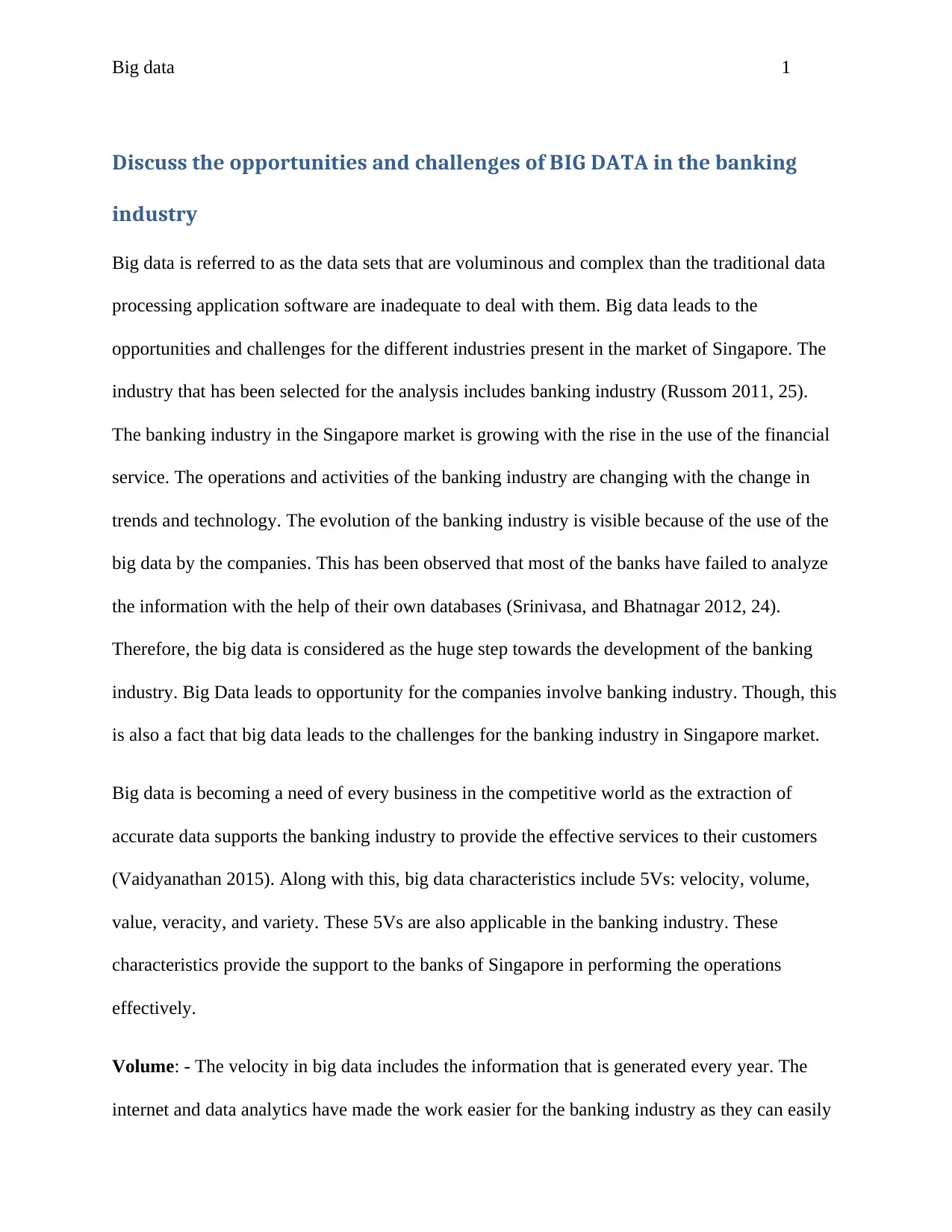
Big data 1
Discuss the opportunities and challenges of BIG DATA in the banking
industry
Big data is referred to as the data sets that are voluminous and complex than the traditional data
processing application software are inadequate to deal with them. Big data leads to the
opportunities and challenges for the different industries present in the market of Singapore. The
industry that has been selected for the analysis includes banking industry (Russom 2011, 25).
The banking industry in the Singapore market is growing with the rise in the use of the financial
service. The operations and activities of the banking industry are changing with the change in
trends and technology. The evolution of the banking industry is visible because of the use of the
big data by the companies. This has been observed that most of the banks have failed to analyze
the information with the help of their own databases (Srinivasa, and Bhatnagar 2012, 24).
Therefore, the big data is considered as the huge step towards the development of the banking
industry. Big Data leads to opportunity for the companies involve banking industry. Though, this
is also a fact that big data leads to the challenges for the banking industry in Singapore market.
Big data is becoming a need of every business in the competitive world as the extraction of
accurate data supports the banking industry to provide the effective services to their customers
(Vaidyanathan 2015). Along with this, big data characteristics include 5Vs: velocity, volume,
value, veracity, and variety. These 5Vs are also applicable in the banking industry. These
characteristics provide the support to the banks of Singapore in performing the operations
effectively.
Volume: - The velocity in big data includes the information that is generated every year. The
internet and data analytics have made the work easier for the banking industry as they can easily
Discuss the opportunities and challenges of BIG DATA in the banking
industry
Big data is referred to as the data sets that are voluminous and complex than the traditional data
processing application software are inadequate to deal with them. Big data leads to the
opportunities and challenges for the different industries present in the market of Singapore. The
industry that has been selected for the analysis includes banking industry (Russom 2011, 25).
The banking industry in the Singapore market is growing with the rise in the use of the financial
service. The operations and activities of the banking industry are changing with the change in
trends and technology. The evolution of the banking industry is visible because of the use of the
big data by the companies. This has been observed that most of the banks have failed to analyze
the information with the help of their own databases (Srinivasa, and Bhatnagar 2012, 24).
Therefore, the big data is considered as the huge step towards the development of the banking
industry. Big Data leads to opportunity for the companies involve banking industry. Though, this
is also a fact that big data leads to the challenges for the banking industry in Singapore market.
Big data is becoming a need of every business in the competitive world as the extraction of
accurate data supports the banking industry to provide the effective services to their customers
(Vaidyanathan 2015). Along with this, big data characteristics include 5Vs: velocity, volume,
value, veracity, and variety. These 5Vs are also applicable in the banking industry. These
characteristics provide the support to the banks of Singapore in performing the operations
effectively.
Volume: - The velocity in big data includes the information that is generated every year. The
internet and data analytics have made the work easier for the banking industry as they can easily
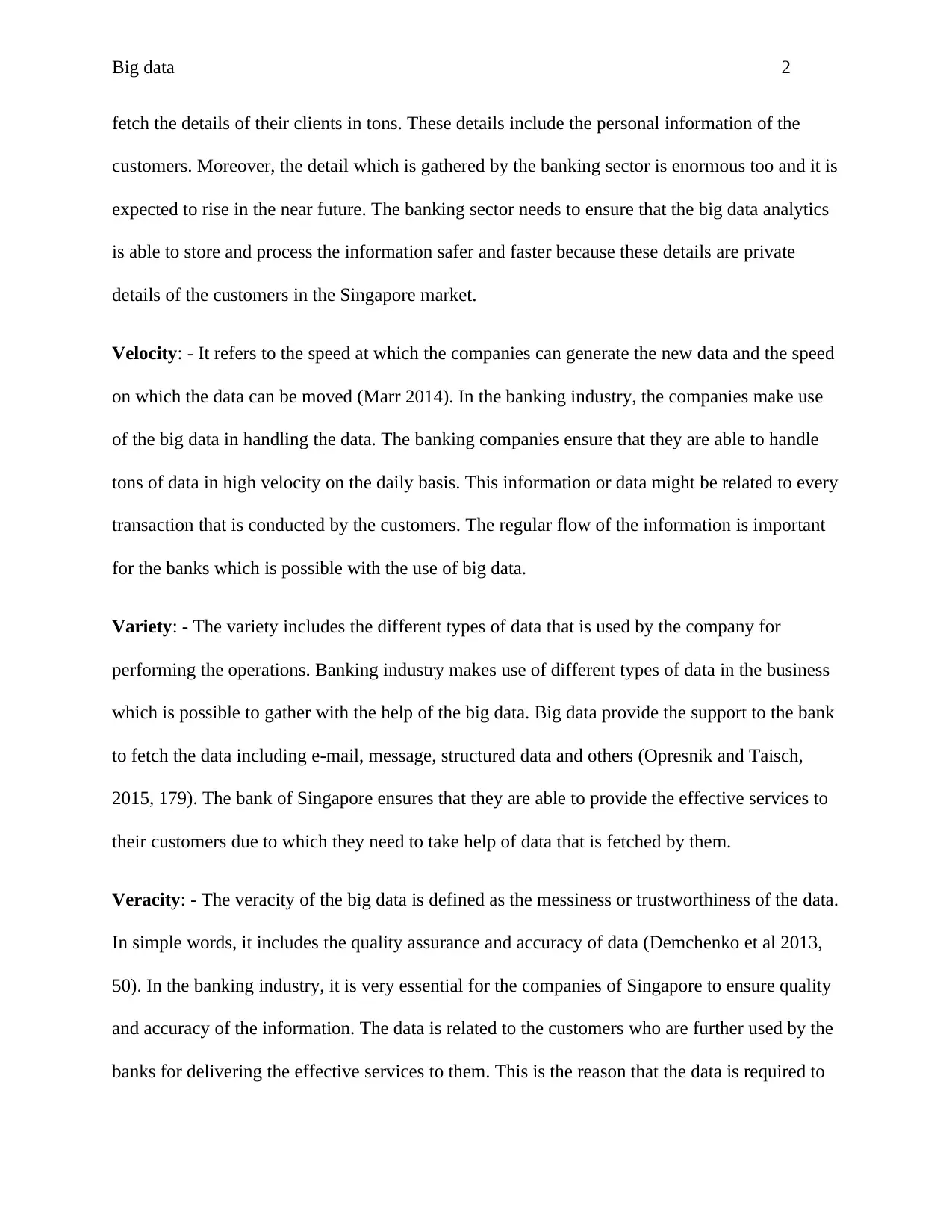
Big data 2
fetch the details of their clients in tons. These details include the personal information of the
customers. Moreover, the detail which is gathered by the banking sector is enormous too and it is
expected to rise in the near future. The banking sector needs to ensure that the big data analytics
is able to store and process the information safer and faster because these details are private
details of the customers in the Singapore market.
Velocity: - It refers to the speed at which the companies can generate the new data and the speed
on which the data can be moved (Marr 2014). In the banking industry, the companies make use
of the big data in handling the data. The banking companies ensure that they are able to handle
tons of data in high velocity on the daily basis. This information or data might be related to every
transaction that is conducted by the customers. The regular flow of the information is important
for the banks which is possible with the use of big data.
Variety: - The variety includes the different types of data that is used by the company for
performing the operations. Banking industry makes use of different types of data in the business
which is possible to gather with the help of the big data. Big data provide the support to the bank
to fetch the data including e-mail, message, structured data and others (Opresnik and Taisch,
2015, 179). The bank of Singapore ensures that they are able to provide the effective services to
their customers due to which they need to take help of data that is fetched by them.
Veracity: - The veracity of the big data is defined as the messiness or trustworthiness of the data.
In simple words, it includes the quality assurance and accuracy of data (Demchenko et al 2013,
50). In the banking industry, it is very essential for the companies of Singapore to ensure quality
and accuracy of the information. The data is related to the customers who are further used by the
banks for delivering the effective services to them. This is the reason that the data is required to
fetch the details of their clients in tons. These details include the personal information of the
customers. Moreover, the detail which is gathered by the banking sector is enormous too and it is
expected to rise in the near future. The banking sector needs to ensure that the big data analytics
is able to store and process the information safer and faster because these details are private
details of the customers in the Singapore market.
Velocity: - It refers to the speed at which the companies can generate the new data and the speed
on which the data can be moved (Marr 2014). In the banking industry, the companies make use
of the big data in handling the data. The banking companies ensure that they are able to handle
tons of data in high velocity on the daily basis. This information or data might be related to every
transaction that is conducted by the customers. The regular flow of the information is important
for the banks which is possible with the use of big data.
Variety: - The variety includes the different types of data that is used by the company for
performing the operations. Banking industry makes use of different types of data in the business
which is possible to gather with the help of the big data. Big data provide the support to the bank
to fetch the data including e-mail, message, structured data and others (Opresnik and Taisch,
2015, 179). The bank of Singapore ensures that they are able to provide the effective services to
their customers due to which they need to take help of data that is fetched by them.
Veracity: - The veracity of the big data is defined as the messiness or trustworthiness of the data.
In simple words, it includes the quality assurance and accuracy of data (Demchenko et al 2013,
50). In the banking industry, it is very essential for the companies of Singapore to ensure quality
and accuracy of the information. The data is related to the customers who are further used by the
banks for delivering the effective services to them. This is the reason that the data is required to
⊘ This is a preview!⊘
Do you want full access?
Subscribe today to unlock all pages.

Trusted by 1+ million students worldwide
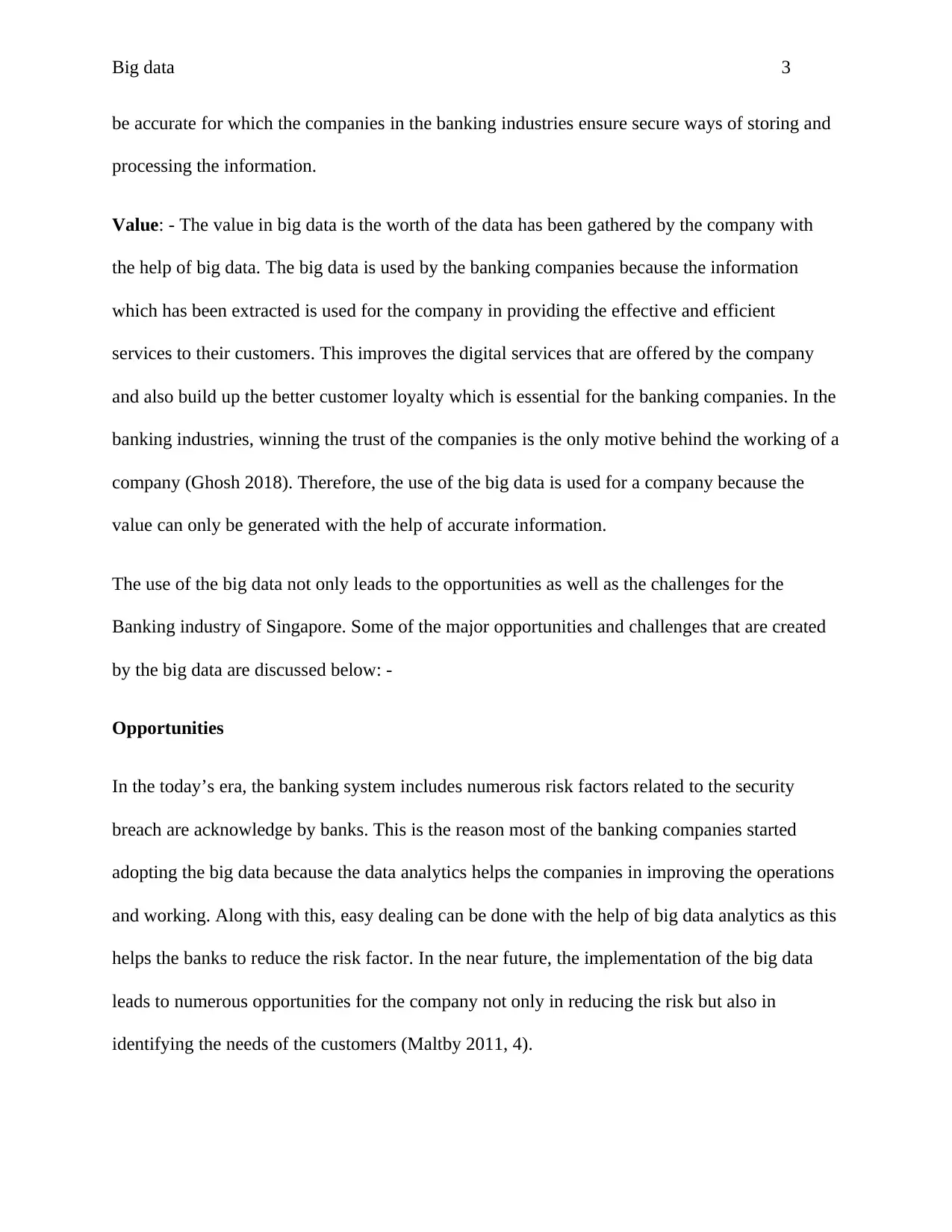
Big data 3
be accurate for which the companies in the banking industries ensure secure ways of storing and
processing the information.
Value: - The value in big data is the worth of the data has been gathered by the company with
the help of big data. The big data is used by the banking companies because the information
which has been extracted is used for the company in providing the effective and efficient
services to their customers. This improves the digital services that are offered by the company
and also build up the better customer loyalty which is essential for the banking companies. In the
banking industries, winning the trust of the companies is the only motive behind the working of a
company (Ghosh 2018). Therefore, the use of the big data is used for a company because the
value can only be generated with the help of accurate information.
The use of the big data not only leads to the opportunities as well as the challenges for the
Banking industry of Singapore. Some of the major opportunities and challenges that are created
by the big data are discussed below: -
Opportunities
In the today’s era, the banking system includes numerous risk factors related to the security
breach are acknowledge by banks. This is the reason most of the banking companies started
adopting the big data because the data analytics helps the companies in improving the operations
and working. Along with this, easy dealing can be done with the help of big data analytics as this
helps the banks to reduce the risk factor. In the near future, the implementation of the big data
leads to numerous opportunities for the company not only in reducing the risk but also in
identifying the needs of the customers (Maltby 2011, 4).
be accurate for which the companies in the banking industries ensure secure ways of storing and
processing the information.
Value: - The value in big data is the worth of the data has been gathered by the company with
the help of big data. The big data is used by the banking companies because the information
which has been extracted is used for the company in providing the effective and efficient
services to their customers. This improves the digital services that are offered by the company
and also build up the better customer loyalty which is essential for the banking companies. In the
banking industries, winning the trust of the companies is the only motive behind the working of a
company (Ghosh 2018). Therefore, the use of the big data is used for a company because the
value can only be generated with the help of accurate information.
The use of the big data not only leads to the opportunities as well as the challenges for the
Banking industry of Singapore. Some of the major opportunities and challenges that are created
by the big data are discussed below: -
Opportunities
In the today’s era, the banking system includes numerous risk factors related to the security
breach are acknowledge by banks. This is the reason most of the banking companies started
adopting the big data because the data analytics helps the companies in improving the operations
and working. Along with this, easy dealing can be done with the help of big data analytics as this
helps the banks to reduce the risk factor. In the near future, the implementation of the big data
leads to numerous opportunities for the company not only in reducing the risk but also in
identifying the needs of the customers (Maltby 2011, 4).
Paraphrase This Document
Need a fresh take? Get an instant paraphrase of this document with our AI Paraphraser
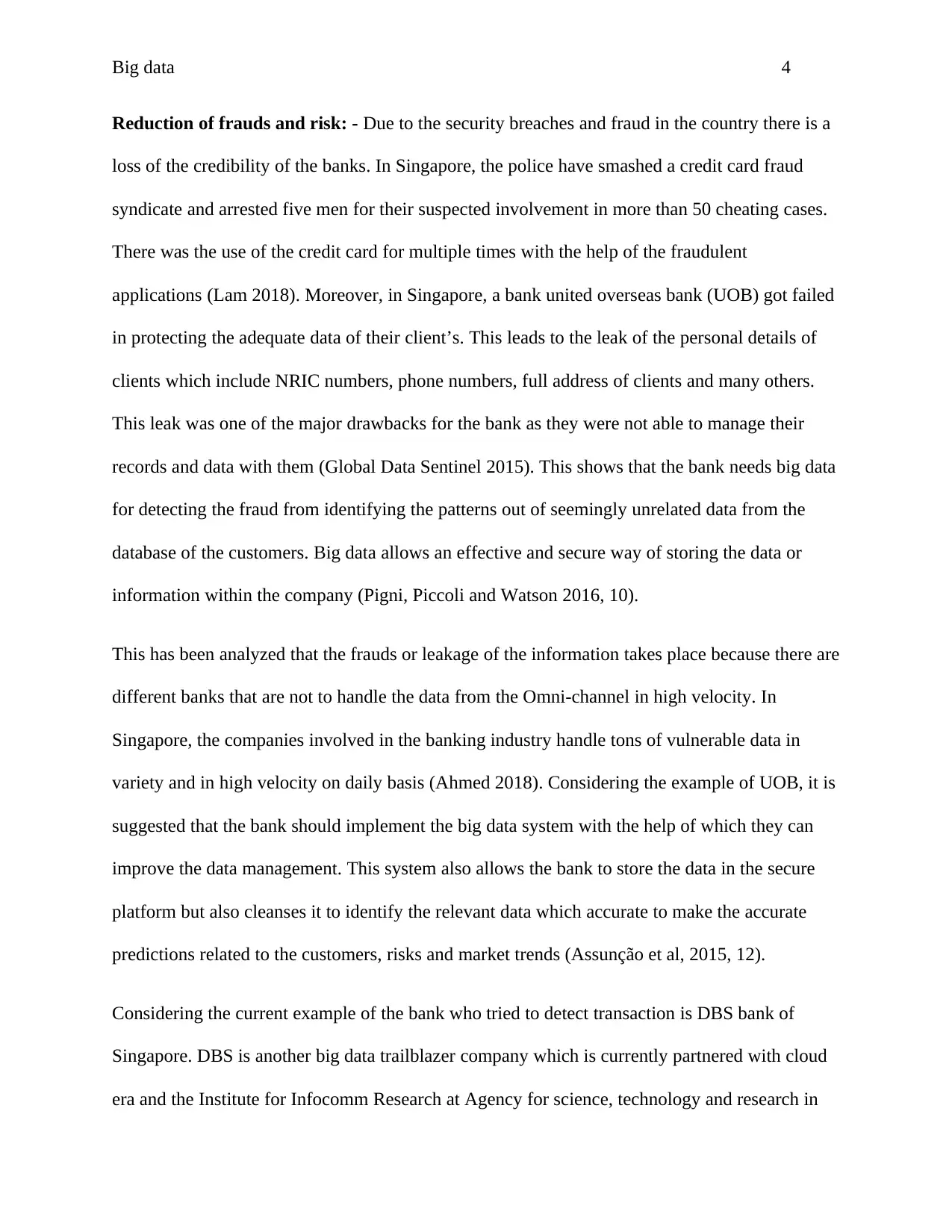
Big data 4
Reduction of frauds and risk: - Due to the security breaches and fraud in the country there is a
loss of the credibility of the banks. In Singapore, the police have smashed a credit card fraud
syndicate and arrested five men for their suspected involvement in more than 50 cheating cases.
There was the use of the credit card for multiple times with the help of the fraudulent
applications (Lam 2018). Moreover, in Singapore, a bank united overseas bank (UOB) got failed
in protecting the adequate data of their client’s. This leads to the leak of the personal details of
clients which include NRIC numbers, phone numbers, full address of clients and many others.
This leak was one of the major drawbacks for the bank as they were not able to manage their
records and data with them (Global Data Sentinel 2015). This shows that the bank needs big data
for detecting the fraud from identifying the patterns out of seemingly unrelated data from the
database of the customers. Big data allows an effective and secure way of storing the data or
information within the company (Pigni, Piccoli and Watson 2016, 10).
This has been analyzed that the frauds or leakage of the information takes place because there are
different banks that are not to handle the data from the Omni-channel in high velocity. In
Singapore, the companies involved in the banking industry handle tons of vulnerable data in
variety and in high velocity on daily basis (Ahmed 2018). Considering the example of UOB, it is
suggested that the bank should implement the big data system with the help of which they can
improve the data management. This system also allows the bank to store the data in the secure
platform but also cleanses it to identify the relevant data which accurate to make the accurate
predictions related to the customers, risks and market trends (Assunção et al, 2015, 12).
Considering the current example of the bank who tried to detect transaction is DBS bank of
Singapore. DBS is another big data trailblazer company which is currently partnered with cloud
era and the Institute for Infocomm Research at Agency for science, technology and research in
Reduction of frauds and risk: - Due to the security breaches and fraud in the country there is a
loss of the credibility of the banks. In Singapore, the police have smashed a credit card fraud
syndicate and arrested five men for their suspected involvement in more than 50 cheating cases.
There was the use of the credit card for multiple times with the help of the fraudulent
applications (Lam 2018). Moreover, in Singapore, a bank united overseas bank (UOB) got failed
in protecting the adequate data of their client’s. This leads to the leak of the personal details of
clients which include NRIC numbers, phone numbers, full address of clients and many others.
This leak was one of the major drawbacks for the bank as they were not able to manage their
records and data with them (Global Data Sentinel 2015). This shows that the bank needs big data
for detecting the fraud from identifying the patterns out of seemingly unrelated data from the
database of the customers. Big data allows an effective and secure way of storing the data or
information within the company (Pigni, Piccoli and Watson 2016, 10).
This has been analyzed that the frauds or leakage of the information takes place because there are
different banks that are not to handle the data from the Omni-channel in high velocity. In
Singapore, the companies involved in the banking industry handle tons of vulnerable data in
variety and in high velocity on daily basis (Ahmed 2018). Considering the example of UOB, it is
suggested that the bank should implement the big data system with the help of which they can
improve the data management. This system also allows the bank to store the data in the secure
platform but also cleanses it to identify the relevant data which accurate to make the accurate
predictions related to the customers, risks and market trends (Assunção et al, 2015, 12).
Considering the current example of the bank who tried to detect transaction is DBS bank of
Singapore. DBS is another big data trailblazer company which is currently partnered with cloud
era and the Institute for Infocomm Research at Agency for science, technology and research in
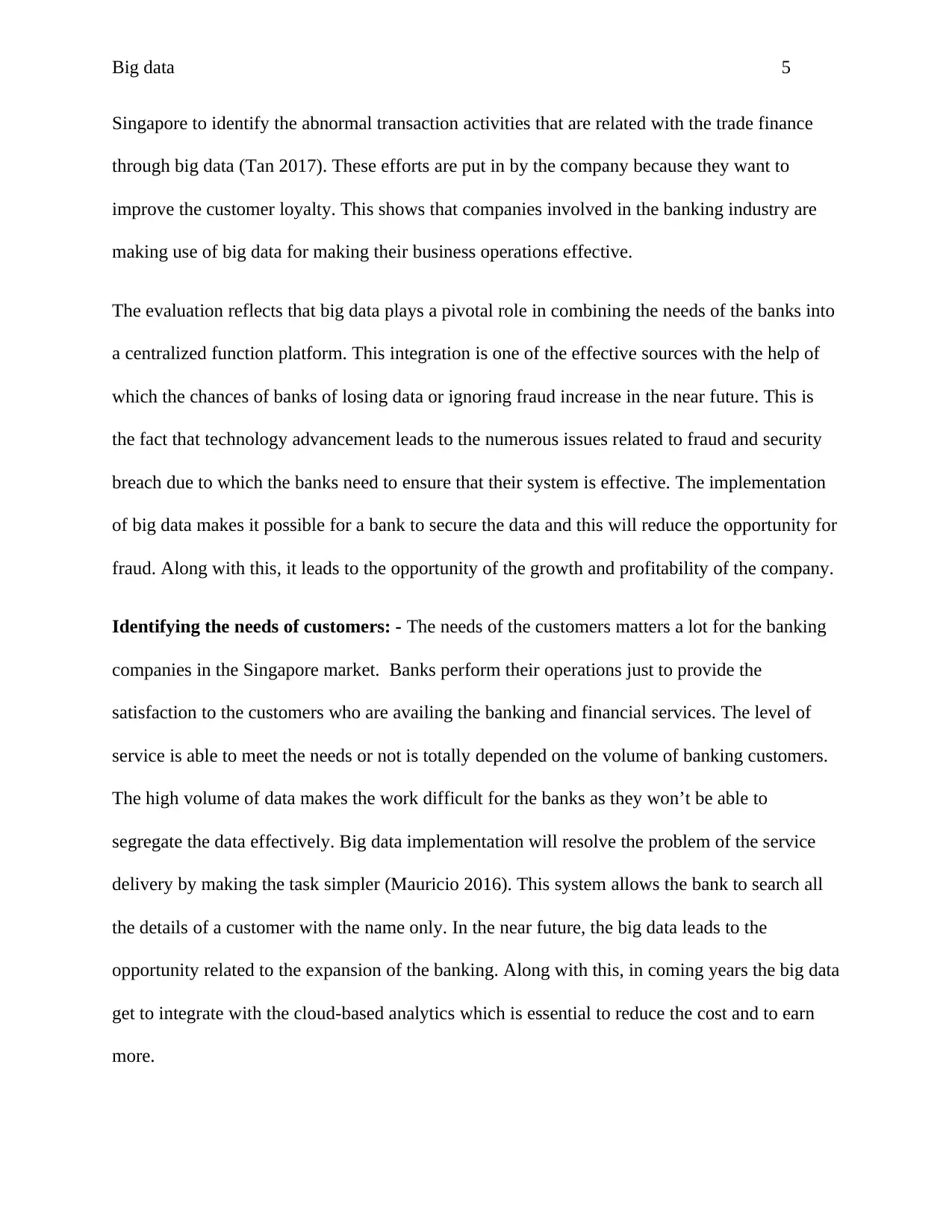
Big data 5
Singapore to identify the abnormal transaction activities that are related with the trade finance
through big data (Tan 2017). These efforts are put in by the company because they want to
improve the customer loyalty. This shows that companies involved in the banking industry are
making use of big data for making their business operations effective.
The evaluation reflects that big data plays a pivotal role in combining the needs of the banks into
a centralized function platform. This integration is one of the effective sources with the help of
which the chances of banks of losing data or ignoring fraud increase in the near future. This is
the fact that technology advancement leads to the numerous issues related to fraud and security
breach due to which the banks need to ensure that their system is effective. The implementation
of big data makes it possible for a bank to secure the data and this will reduce the opportunity for
fraud. Along with this, it leads to the opportunity of the growth and profitability of the company.
Identifying the needs of customers: - The needs of the customers matters a lot for the banking
companies in the Singapore market. Banks perform their operations just to provide the
satisfaction to the customers who are availing the banking and financial services. The level of
service is able to meet the needs or not is totally depended on the volume of banking customers.
The high volume of data makes the work difficult for the banks as they won’t be able to
segregate the data effectively. Big data implementation will resolve the problem of the service
delivery by making the task simpler (Mauricio 2016). This system allows the bank to search all
the details of a customer with the name only. In the near future, the big data leads to the
opportunity related to the expansion of the banking. Along with this, in coming years the big data
get to integrate with the cloud-based analytics which is essential to reduce the cost and to earn
more.
Singapore to identify the abnormal transaction activities that are related with the trade finance
through big data (Tan 2017). These efforts are put in by the company because they want to
improve the customer loyalty. This shows that companies involved in the banking industry are
making use of big data for making their business operations effective.
The evaluation reflects that big data plays a pivotal role in combining the needs of the banks into
a centralized function platform. This integration is one of the effective sources with the help of
which the chances of banks of losing data or ignoring fraud increase in the near future. This is
the fact that technology advancement leads to the numerous issues related to fraud and security
breach due to which the banks need to ensure that their system is effective. The implementation
of big data makes it possible for a bank to secure the data and this will reduce the opportunity for
fraud. Along with this, it leads to the opportunity of the growth and profitability of the company.
Identifying the needs of customers: - The needs of the customers matters a lot for the banking
companies in the Singapore market. Banks perform their operations just to provide the
satisfaction to the customers who are availing the banking and financial services. The level of
service is able to meet the needs or not is totally depended on the volume of banking customers.
The high volume of data makes the work difficult for the banks as they won’t be able to
segregate the data effectively. Big data implementation will resolve the problem of the service
delivery by making the task simpler (Mauricio 2016). This system allows the bank to search all
the details of a customer with the name only. In the near future, the big data leads to the
opportunity related to the expansion of the banking. Along with this, in coming years the big data
get to integrate with the cloud-based analytics which is essential to reduce the cost and to earn
more.
⊘ This is a preview!⊘
Do you want full access?
Subscribe today to unlock all pages.

Trusted by 1+ million students worldwide
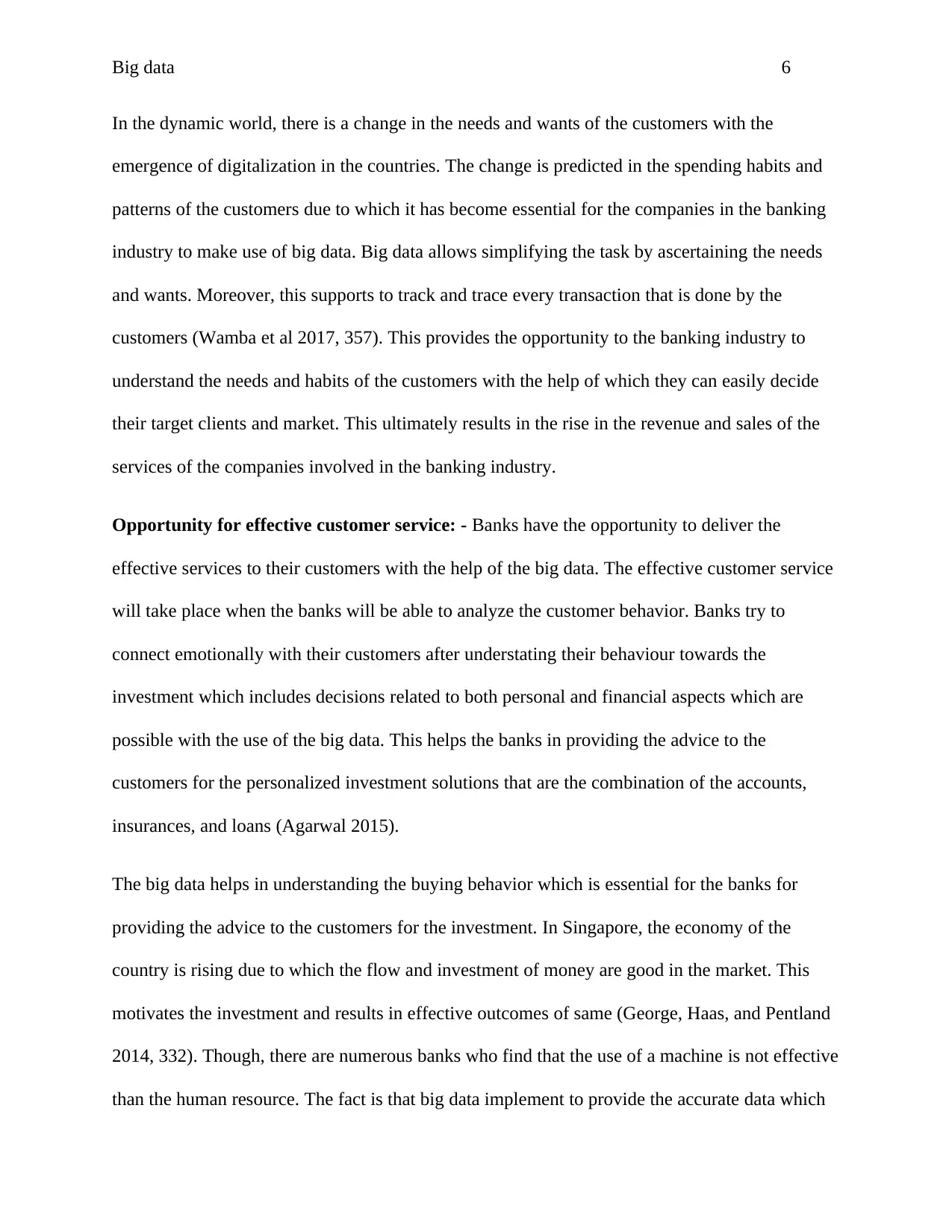
Big data 6
In the dynamic world, there is a change in the needs and wants of the customers with the
emergence of digitalization in the countries. The change is predicted in the spending habits and
patterns of the customers due to which it has become essential for the companies in the banking
industry to make use of big data. Big data allows simplifying the task by ascertaining the needs
and wants. Moreover, this supports to track and trace every transaction that is done by the
customers (Wamba et al 2017, 357). This provides the opportunity to the banking industry to
understand the needs and habits of the customers with the help of which they can easily decide
their target clients and market. This ultimately results in the rise in the revenue and sales of the
services of the companies involved in the banking industry.
Opportunity for effective customer service: - Banks have the opportunity to deliver the
effective services to their customers with the help of the big data. The effective customer service
will take place when the banks will be able to analyze the customer behavior. Banks try to
connect emotionally with their customers after understating their behaviour towards the
investment which includes decisions related to both personal and financial aspects which are
possible with the use of the big data. This helps the banks in providing the advice to the
customers for the personalized investment solutions that are the combination of the accounts,
insurances, and loans (Agarwal 2015).
The big data helps in understanding the buying behavior which is essential for the banks for
providing the advice to the customers for the investment. In Singapore, the economy of the
country is rising due to which the flow and investment of money are good in the market. This
motivates the investment and results in effective outcomes of same (George, Haas, and Pentland
2014, 332). Though, there are numerous banks who find that the use of a machine is not effective
than the human resource. The fact is that big data implement to provide the accurate data which
In the dynamic world, there is a change in the needs and wants of the customers with the
emergence of digitalization in the countries. The change is predicted in the spending habits and
patterns of the customers due to which it has become essential for the companies in the banking
industry to make use of big data. Big data allows simplifying the task by ascertaining the needs
and wants. Moreover, this supports to track and trace every transaction that is done by the
customers (Wamba et al 2017, 357). This provides the opportunity to the banking industry to
understand the needs and habits of the customers with the help of which they can easily decide
their target clients and market. This ultimately results in the rise in the revenue and sales of the
services of the companies involved in the banking industry.
Opportunity for effective customer service: - Banks have the opportunity to deliver the
effective services to their customers with the help of the big data. The effective customer service
will take place when the banks will be able to analyze the customer behavior. Banks try to
connect emotionally with their customers after understating their behaviour towards the
investment which includes decisions related to both personal and financial aspects which are
possible with the use of the big data. This helps the banks in providing the advice to the
customers for the personalized investment solutions that are the combination of the accounts,
insurances, and loans (Agarwal 2015).
The big data helps in understanding the buying behavior which is essential for the banks for
providing the advice to the customers for the investment. In Singapore, the economy of the
country is rising due to which the flow and investment of money are good in the market. This
motivates the investment and results in effective outcomes of same (George, Haas, and Pentland
2014, 332). Though, there are numerous banks who find that the use of a machine is not effective
than the human resource. The fact is that big data implement to provide the accurate data which
Paraphrase This Document
Need a fresh take? Get an instant paraphrase of this document with our AI Paraphraser
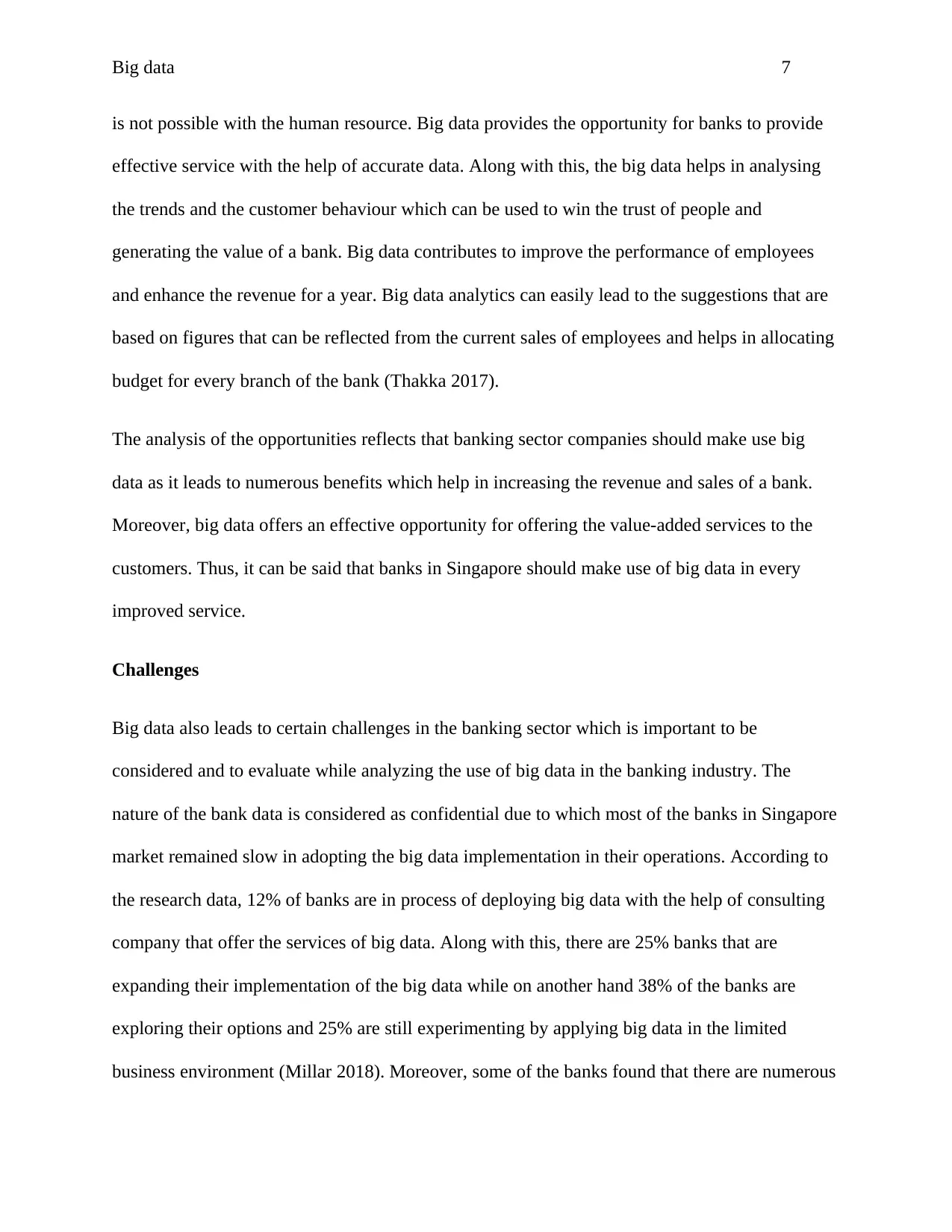
Big data 7
is not possible with the human resource. Big data provides the opportunity for banks to provide
effective service with the help of accurate data. Along with this, the big data helps in analysing
the trends and the customer behaviour which can be used to win the trust of people and
generating the value of a bank. Big data contributes to improve the performance of employees
and enhance the revenue for a year. Big data analytics can easily lead to the suggestions that are
based on figures that can be reflected from the current sales of employees and helps in allocating
budget for every branch of the bank (Thakka 2017).
The analysis of the opportunities reflects that banking sector companies should make use big
data as it leads to numerous benefits which help in increasing the revenue and sales of a bank.
Moreover, big data offers an effective opportunity for offering the value-added services to the
customers. Thus, it can be said that banks in Singapore should make use of big data in every
improved service.
Challenges
Big data also leads to certain challenges in the banking sector which is important to be
considered and to evaluate while analyzing the use of big data in the banking industry. The
nature of the bank data is considered as confidential due to which most of the banks in Singapore
market remained slow in adopting the big data implementation in their operations. According to
the research data, 12% of banks are in process of deploying big data with the help of consulting
company that offer the services of big data. Along with this, there are 25% banks that are
expanding their implementation of the big data while on another hand 38% of the banks are
exploring their options and 25% are still experimenting by applying big data in the limited
business environment (Millar 2018). Moreover, some of the banks found that there are numerous
is not possible with the human resource. Big data provides the opportunity for banks to provide
effective service with the help of accurate data. Along with this, the big data helps in analysing
the trends and the customer behaviour which can be used to win the trust of people and
generating the value of a bank. Big data contributes to improve the performance of employees
and enhance the revenue for a year. Big data analytics can easily lead to the suggestions that are
based on figures that can be reflected from the current sales of employees and helps in allocating
budget for every branch of the bank (Thakka 2017).
The analysis of the opportunities reflects that banking sector companies should make use big
data as it leads to numerous benefits which help in increasing the revenue and sales of a bank.
Moreover, big data offers an effective opportunity for offering the value-added services to the
customers. Thus, it can be said that banks in Singapore should make use of big data in every
improved service.
Challenges
Big data also leads to certain challenges in the banking sector which is important to be
considered and to evaluate while analyzing the use of big data in the banking industry. The
nature of the bank data is considered as confidential due to which most of the banks in Singapore
market remained slow in adopting the big data implementation in their operations. According to
the research data, 12% of banks are in process of deploying big data with the help of consulting
company that offer the services of big data. Along with this, there are 25% banks that are
expanding their implementation of the big data while on another hand 38% of the banks are
exploring their options and 25% are still experimenting by applying big data in the limited
business environment (Millar 2018). Moreover, some of the banks found that there are numerous
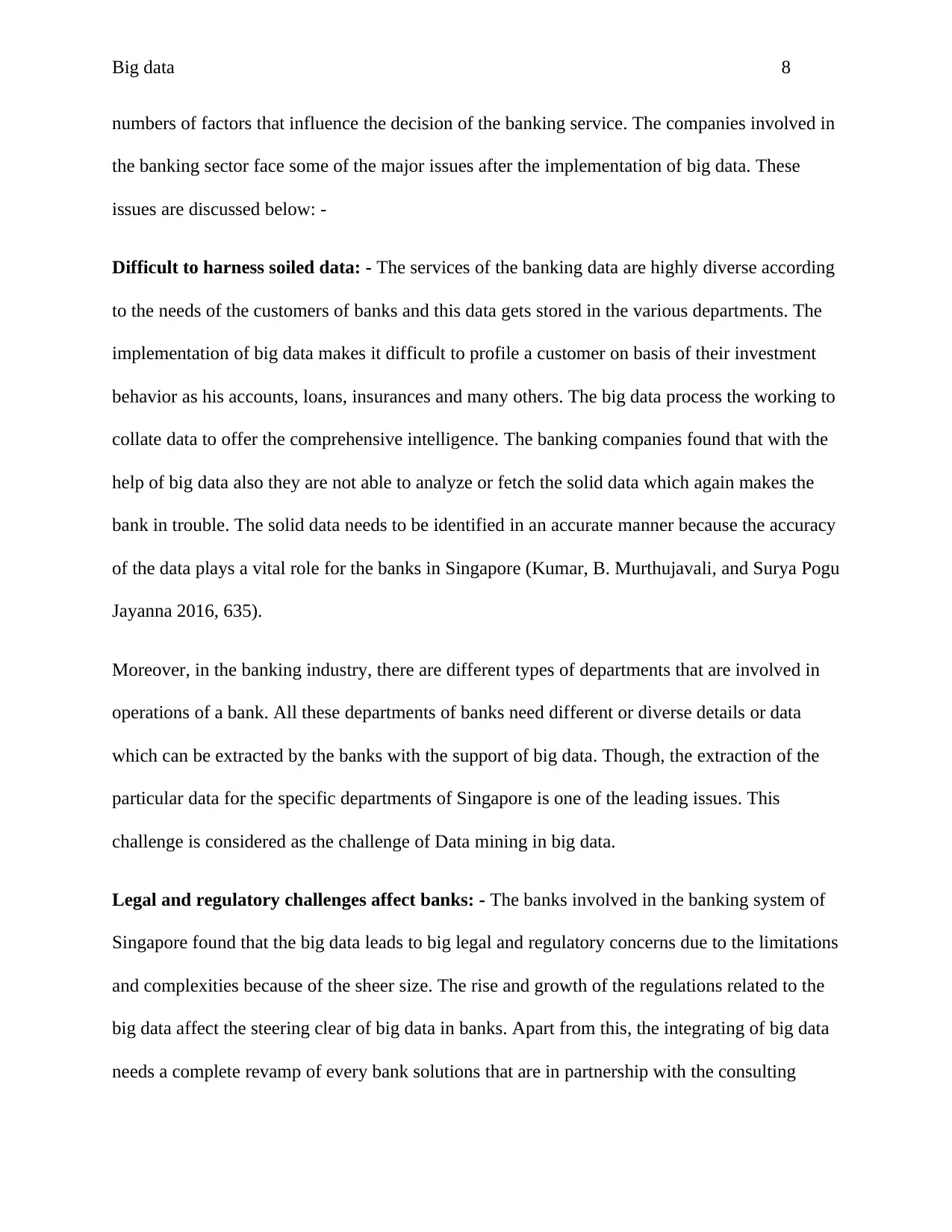
Big data 8
numbers of factors that influence the decision of the banking service. The companies involved in
the banking sector face some of the major issues after the implementation of big data. These
issues are discussed below: -
Difficult to harness soiled data: - The services of the banking data are highly diverse according
to the needs of the customers of banks and this data gets stored in the various departments. The
implementation of big data makes it difficult to profile a customer on basis of their investment
behavior as his accounts, loans, insurances and many others. The big data process the working to
collate data to offer the comprehensive intelligence. The banking companies found that with the
help of big data also they are not able to analyze or fetch the solid data which again makes the
bank in trouble. The solid data needs to be identified in an accurate manner because the accuracy
of the data plays a vital role for the banks in Singapore (Kumar, B. Murthujavali, and Surya Pogu
Jayanna 2016, 635).
Moreover, in the banking industry, there are different types of departments that are involved in
operations of a bank. All these departments of banks need different or diverse details or data
which can be extracted by the banks with the support of big data. Though, the extraction of the
particular data for the specific departments of Singapore is one of the leading issues. This
challenge is considered as the challenge of Data mining in big data.
Legal and regulatory challenges affect banks: - The banks involved in the banking system of
Singapore found that the big data leads to big legal and regulatory concerns due to the limitations
and complexities because of the sheer size. The rise and growth of the regulations related to the
big data affect the steering clear of big data in banks. Apart from this, the integrating of big data
needs a complete revamp of every bank solutions that are in partnership with the consulting
numbers of factors that influence the decision of the banking service. The companies involved in
the banking sector face some of the major issues after the implementation of big data. These
issues are discussed below: -
Difficult to harness soiled data: - The services of the banking data are highly diverse according
to the needs of the customers of banks and this data gets stored in the various departments. The
implementation of big data makes it difficult to profile a customer on basis of their investment
behavior as his accounts, loans, insurances and many others. The big data process the working to
collate data to offer the comprehensive intelligence. The banking companies found that with the
help of big data also they are not able to analyze or fetch the solid data which again makes the
bank in trouble. The solid data needs to be identified in an accurate manner because the accuracy
of the data plays a vital role for the banks in Singapore (Kumar, B. Murthujavali, and Surya Pogu
Jayanna 2016, 635).
Moreover, in the banking industry, there are different types of departments that are involved in
operations of a bank. All these departments of banks need different or diverse details or data
which can be extracted by the banks with the support of big data. Though, the extraction of the
particular data for the specific departments of Singapore is one of the leading issues. This
challenge is considered as the challenge of Data mining in big data.
Legal and regulatory challenges affect banks: - The banks involved in the banking system of
Singapore found that the big data leads to big legal and regulatory concerns due to the limitations
and complexities because of the sheer size. The rise and growth of the regulations related to the
big data affect the steering clear of big data in banks. Apart from this, the integrating of big data
needs a complete revamp of every bank solutions that are in partnership with the consulting
⊘ This is a preview!⊘
Do you want full access?
Subscribe today to unlock all pages.

Trusted by 1+ million students worldwide
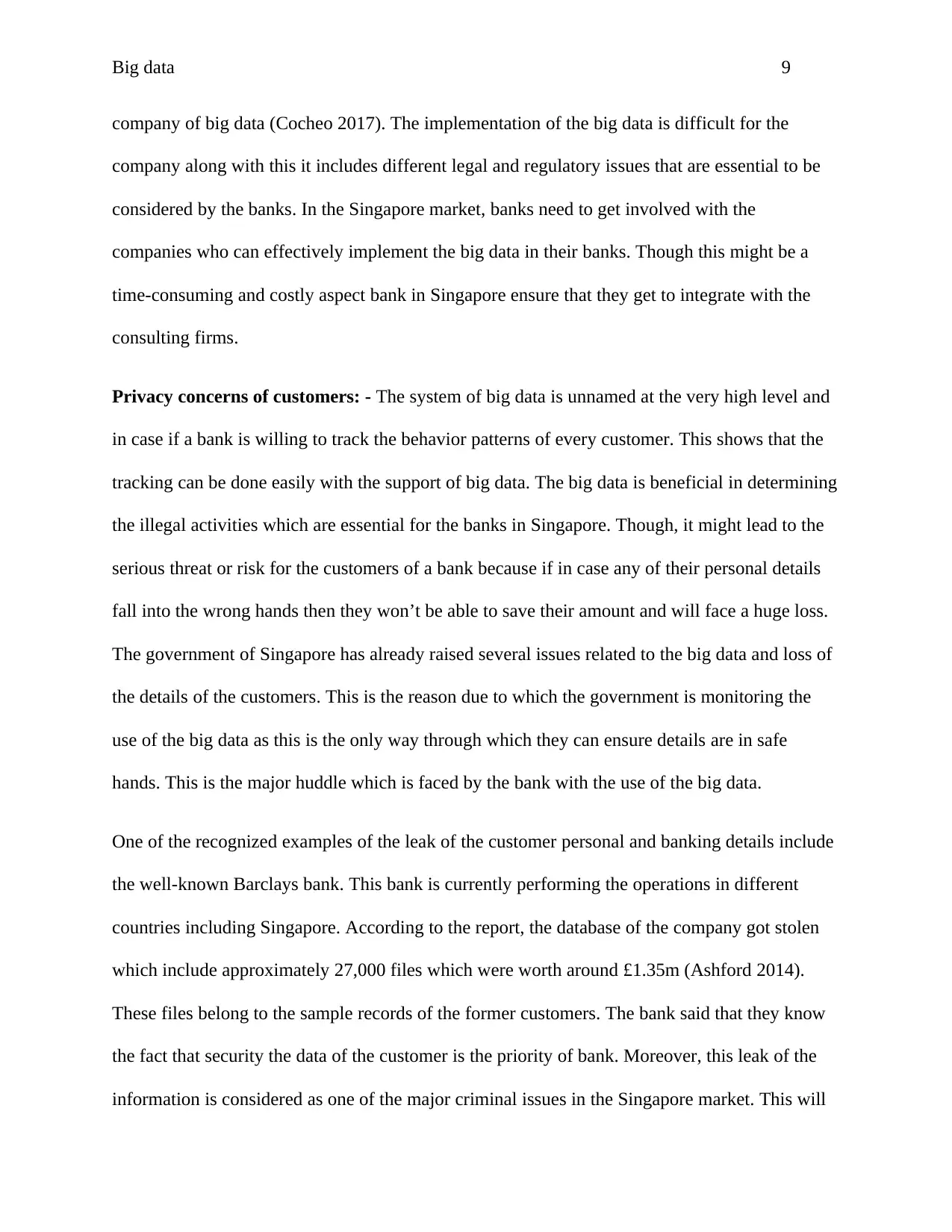
Big data 9
company of big data (Cocheo 2017). The implementation of the big data is difficult for the
company along with this it includes different legal and regulatory issues that are essential to be
considered by the banks. In the Singapore market, banks need to get involved with the
companies who can effectively implement the big data in their banks. Though this might be a
time-consuming and costly aspect bank in Singapore ensure that they get to integrate with the
consulting firms.
Privacy concerns of customers: - The system of big data is unnamed at the very high level and
in case if a bank is willing to track the behavior patterns of every customer. This shows that the
tracking can be done easily with the support of big data. The big data is beneficial in determining
the illegal activities which are essential for the banks in Singapore. Though, it might lead to the
serious threat or risk for the customers of a bank because if in case any of their personal details
fall into the wrong hands then they won’t be able to save their amount and will face a huge loss.
The government of Singapore has already raised several issues related to the big data and loss of
the details of the customers. This is the reason due to which the government is monitoring the
use of the big data as this is the only way through which they can ensure details are in safe
hands. This is the major huddle which is faced by the bank with the use of the big data.
One of the recognized examples of the leak of the customer personal and banking details include
the well-known Barclays bank. This bank is currently performing the operations in different
countries including Singapore. According to the report, the database of the company got stolen
which include approximately 27,000 files which were worth around £1.35m (Ashford 2014).
These files belong to the sample records of the former customers. The bank said that they know
the fact that security the data of the customer is the priority of bank. Moreover, this leak of the
information is considered as one of the major criminal issues in the Singapore market. This will
company of big data (Cocheo 2017). The implementation of the big data is difficult for the
company along with this it includes different legal and regulatory issues that are essential to be
considered by the banks. In the Singapore market, banks need to get involved with the
companies who can effectively implement the big data in their banks. Though this might be a
time-consuming and costly aspect bank in Singapore ensure that they get to integrate with the
consulting firms.
Privacy concerns of customers: - The system of big data is unnamed at the very high level and
in case if a bank is willing to track the behavior patterns of every customer. This shows that the
tracking can be done easily with the support of big data. The big data is beneficial in determining
the illegal activities which are essential for the banks in Singapore. Though, it might lead to the
serious threat or risk for the customers of a bank because if in case any of their personal details
fall into the wrong hands then they won’t be able to save their amount and will face a huge loss.
The government of Singapore has already raised several issues related to the big data and loss of
the details of the customers. This is the reason due to which the government is monitoring the
use of the big data as this is the only way through which they can ensure details are in safe
hands. This is the major huddle which is faced by the bank with the use of the big data.
One of the recognized examples of the leak of the customer personal and banking details include
the well-known Barclays bank. This bank is currently performing the operations in different
countries including Singapore. According to the report, the database of the company got stolen
which include approximately 27,000 files which were worth around £1.35m (Ashford 2014).
These files belong to the sample records of the former customers. The bank said that they know
the fact that security the data of the customer is the priority of bank. Moreover, this leak of the
information is considered as one of the major criminal issues in the Singapore market. This will
Paraphrase This Document
Need a fresh take? Get an instant paraphrase of this document with our AI Paraphraser
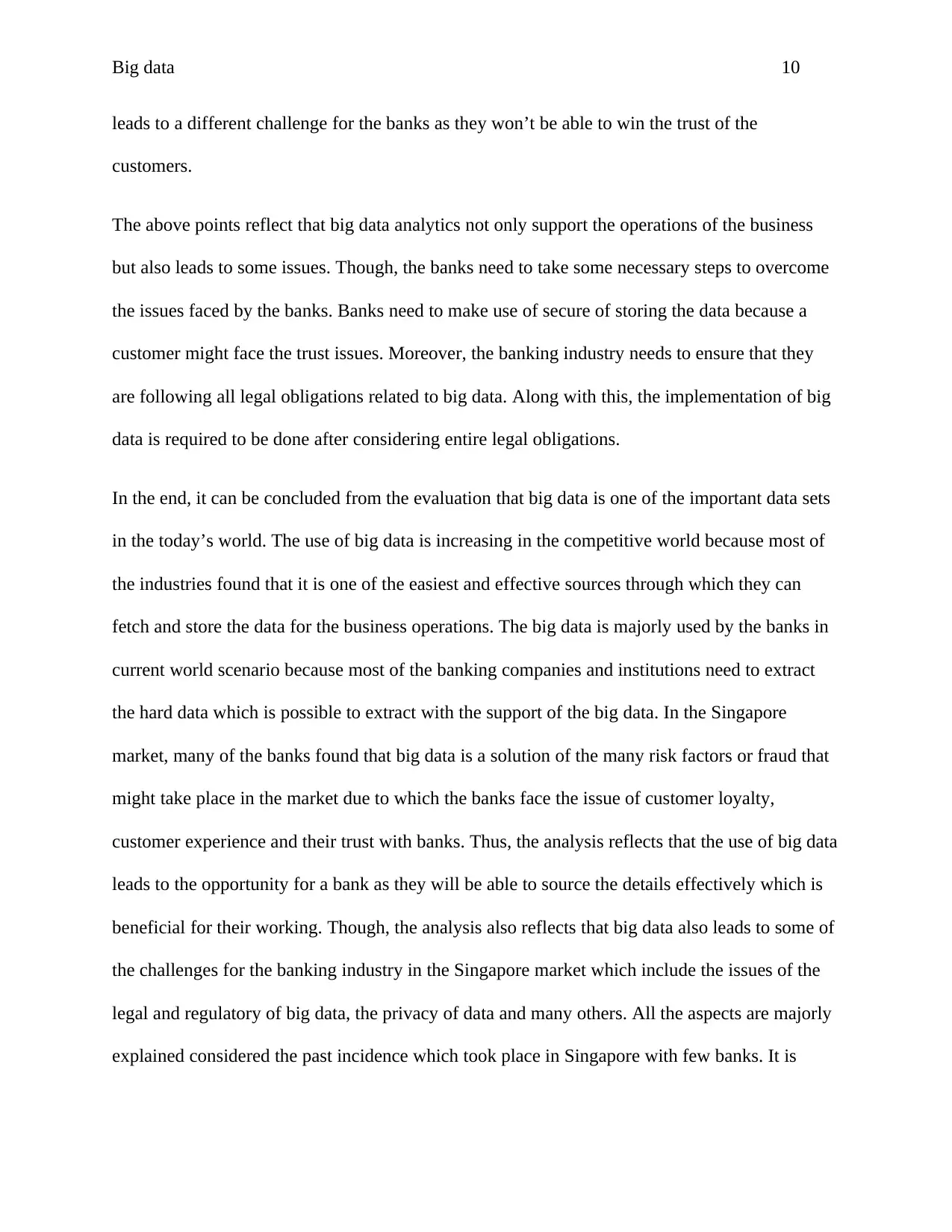
Big data 10
leads to a different challenge for the banks as they won’t be able to win the trust of the
customers.
The above points reflect that big data analytics not only support the operations of the business
but also leads to some issues. Though, the banks need to take some necessary steps to overcome
the issues faced by the banks. Banks need to make use of secure of storing the data because a
customer might face the trust issues. Moreover, the banking industry needs to ensure that they
are following all legal obligations related to big data. Along with this, the implementation of big
data is required to be done after considering entire legal obligations.
In the end, it can be concluded from the evaluation that big data is one of the important data sets
in the today’s world. The use of big data is increasing in the competitive world because most of
the industries found that it is one of the easiest and effective sources through which they can
fetch and store the data for the business operations. The big data is majorly used by the banks in
current world scenario because most of the banking companies and institutions need to extract
the hard data which is possible to extract with the support of the big data. In the Singapore
market, many of the banks found that big data is a solution of the many risk factors or fraud that
might take place in the market due to which the banks face the issue of customer loyalty,
customer experience and their trust with banks. Thus, the analysis reflects that the use of big data
leads to the opportunity for a bank as they will be able to source the details effectively which is
beneficial for their working. Though, the analysis also reflects that big data also leads to some of
the challenges for the banking industry in the Singapore market which include the issues of the
legal and regulatory of big data, the privacy of data and many others. All the aspects are majorly
explained considered the past incidence which took place in Singapore with few banks. It is
leads to a different challenge for the banks as they won’t be able to win the trust of the
customers.
The above points reflect that big data analytics not only support the operations of the business
but also leads to some issues. Though, the banks need to take some necessary steps to overcome
the issues faced by the banks. Banks need to make use of secure of storing the data because a
customer might face the trust issues. Moreover, the banking industry needs to ensure that they
are following all legal obligations related to big data. Along with this, the implementation of big
data is required to be done after considering entire legal obligations.
In the end, it can be concluded from the evaluation that big data is one of the important data sets
in the today’s world. The use of big data is increasing in the competitive world because most of
the industries found that it is one of the easiest and effective sources through which they can
fetch and store the data for the business operations. The big data is majorly used by the banks in
current world scenario because most of the banking companies and institutions need to extract
the hard data which is possible to extract with the support of the big data. In the Singapore
market, many of the banks found that big data is a solution of the many risk factors or fraud that
might take place in the market due to which the banks face the issue of customer loyalty,
customer experience and their trust with banks. Thus, the analysis reflects that the use of big data
leads to the opportunity for a bank as they will be able to source the details effectively which is
beneficial for their working. Though, the analysis also reflects that big data also leads to some of
the challenges for the banking industry in the Singapore market which include the issues of the
legal and regulatory of big data, the privacy of data and many others. All the aspects are majorly
explained considered the past incidence which took place in Singapore with few banks. It is

Big data 11
recommended to the banks involved in the banking industry to ensure that they are using big data
and effective implementation of same has been done in Singapore market.
recommended to the banks involved in the banking industry to ensure that they are using big data
and effective implementation of same has been done in Singapore market.
⊘ This is a preview!⊘
Do you want full access?
Subscribe today to unlock all pages.

Trusted by 1+ million students worldwide
1 out of 17
Related Documents
Your All-in-One AI-Powered Toolkit for Academic Success.
+13062052269
info@desklib.com
Available 24*7 on WhatsApp / Email
![[object Object]](/_next/static/media/star-bottom.7253800d.svg)
Unlock your academic potential
Copyright © 2020–2026 A2Z Services. All Rights Reserved. Developed and managed by ZUCOL.



